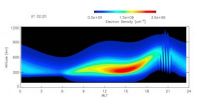Breakthrough for more efficient drug development
2011-01-19
(Press-News.org) Developing new drugs is a highly costly and time-consuming process. Of 20 candidates, 19 are normally rejected because they don't work or have unwanted side effects. Now a research team led by Professor Lars Baltzer at Uppsala University has produced a tiny molecular "binder" that has the potential to change this landscape radically.
The study, published today in the prestigious journal Angewandte Chemie, presents the concept of a tiny polypeptide consisting of 42 amino acids to which virtually any target-seeking organic molecule can be bound. In the body it then seeks out the designated sites to be treated. What's unique about the polypeptide is that it dramatically enhances the properties of the little molecule in a simple and very general way.
- This produces superbinders. They bind more strongly and more specifically than other alternatives, says Lars Baltzer, professor of organic chemistry, who believes it will be possible to rapidly develop new drugs much more readily with this new concept.
The whole concept goes against the grain of what is usually done in drug development. Traditionally it's usually a matter of synthesizing drugs from A to Z, with certain requirements needing to be met in order to succeed. Drugs should be low molecular (500 Da), be highly fat soluble, and have no more than ten binding sites in order to pass through the cell membrane. But the majority are ineffective or toxic, and nowadays there are also ways to get larger molecules through cell membranes. Recently therapeutic antibodies have emerged as an alternative. They're large (150,000 Da) and bind to the outside of cells, which they then "block."
The new peptide is 5,000 Da or only 1/30 as large as a typical antibody, which is smaller than was thought possible. But according to Lars Baltzer nature has always signaled that this should work.
- The human growth factor hGH uses 35 amino acids to bind to its receptor, but it turns out that only six of them are critical. The rest can be replaced without significantly changing the function. There's really nothing very special about placing a general peptide on a small molecule, but nobody has done it before, he says.
In this study the peptide was successfully bound to the inflammation marker CRP, which is an indicator of a risk of premature death in heart patients, among other things. Several other studies are underway and are proving to be equally successful.
These findings are of great importance to industry, and several large companies have shown their interest. The spin-out company that was previously formed out of Baltzer's research team is now going to further develop the concept to be able to help the drug industry determine at a considerably earlier stage than today whether a drug candidate is worth pursuing or not.
INFORMATION: END
ELSE PRESS RELEASES FROM THIS DATE:
2011-01-19
WASHINGTON -- The first global simulation study of equatorial spread F (ESF) bubble evolution using a comprehensive 3D ionosphere model, SAMI3, has been demonstrated. The model self-consistently solves for the neutral wind driven dynamo electric field and the gravity driven electric field associated with plasma bubbles.
Developed by Dr. Joseph Huba and Dr. Glenn Joyce at the NRL Plasma Physics Division, SAMI3 is a fully three-dimensional model of the low- to mid-latitude ionosphere. SAMI3 has been modified recently to use a sun-fixed coordinate system to eliminate rotation ...
2011-01-19
Nutrients, vitamins, minerals – during pregnancy a woman's body needs more of them. For most nutrients this increase in demand can be covered with a balanced diet. However, mothers-to-be should ingest some nutrients in the form of tablets. Research conducted by the Chair of Nutritional Medicine at the Technische Universitaet Muenchen (TUM) indicates there are knowledge gaps: According to this study, pregnant women often start taking sensible dietary supplements too late or not at all. At the same time, other micronutrients are unwittingly overdosed whose effects during ...
2011-01-19
Researchers at the University of Warwick have developed the world's first complete High Dynamic Range (HDR) video system, from video capture to image display, that will help a range of users including: surveillance camera operators, surgeons using video to conduct or record surgery, and camera crews following a football being kicked from sunshine into shadow.
The researchers will be premiering footage of the world's first ever showing of a short film shot using this new HDR technology in the WMG Digital Laboratory at the University of Warwick on Wednesday January 19 ...
2011-01-19
Controlling blood pressure is not only a medical challenge, but a social one as well. Because patients are required to strictly adhere to a treatment plan that may include medication, dietary restrictions and regular doctor visits, the ideas of wellness and health are also powerful parts of the social reinforcement needed for behavioral change.
This is especially true in the African American population, which is particularly susceptible to hypertension. Social and cultural barriers have been found to contribute to African American patients being far more likely than white ...
2011-01-19
New research by a team of psychologists from Canada, Belgium, and the United States shows there is more than a literal truth to the saying that 'you never get a second chance to make a first impression'. The findings suggest that new experiences that contradict a first impression become 'bound' to the context in which they were made. As a result, the new experiences influence people's reactions only in that particular context, whereas first impressions still dominate in other contexts.
"Imagine you have a new colleague at work and your impression of that person is not ...
2011-01-19
Boston, Mass. — Following a successful Phase 1 study for safety, researchers at MassBiologics of the University of Massachusetts Medical School (UMMS) today announced the beginning of a Phase 2 clinical trial testing the ability of a human monoclonal antibody they developed to prevent hepatitis C virus (HCV) infection of a donor liver in transplant patients.
The first patients were enrolled in the study in December. The primary goal of this randomized, double-blind, placebo-controlled study is to test if the monoclonal antibody, designated MBL-HCV1, prevents re-infection ...
2011-01-19
Montreal, January 18, 2011 – Does experience give seniors an edge in reacting to sudden change or are younger people quicker to respond? A new study from Concordia University shows that when a routine task is interrupted by an unexpected event, younger adults are faster at responding. Published in the Journal of Gerontology, the findings have implications for educators and for older adults in situations where performance is crucial.
"When we frequently perform a task, our reactions become automatic," says Kevin Trewartha, first author and a PhD student in Concordia's ...
2011-01-19
Key components of the ESA-led Mercury mapper BepiColombo have been tested in a specially upgraded European space simulator. ESA's Large Space Simulator is now the most powerful in the world and the only facility capable of reproducing Mercury's hellish environment for a full-scale spacecraft.
The Mercury Magnetospheric Orbiter (MMO) has survived a simulated voyage to the innermost planet. The octagonal spacecraft, which is Japan's contribution to BepiColombo, and its ESA sunshield withstood temperatures higher than 350°C.
This is a taste of things to come for the ...
2011-01-19
Montreal, January 18, 2011 – Cyndia Charfi, a Ph. D student in biology at Université du Québec à Montréal (UQAM), supported by her thesis supervisors, Professor Éric Rassart, and Adjunct Professor Elsy Edouard, UQAM, Department of Biological Sciences and BIOMED Research Centre, made a major breakthrough in research on B-cell acute lymphocytic leukemia, a disease that occurs most commonly in children. She has successfully identified a gene that may facilitate the diagnosis of this cancer, which is characterized by an abnormal proliferation of B-cells, antibody-producing ...
2011-01-19
Privacy in the digital age is a sensitive issue for both governments and individuals, as recent news about WikiLeaks and Facebook proved. A new research project at Tel Aviv University may better educate citizens of the virtual world about their privacy -- and even help Facebook users avoid truly embarrassing moments.
It's all about fine-tuning privacy settings based on user information and behavior, says Dr. Eran Toch of Tel Aviv University's Iby and Aladar Fleischman Faculty of Engineering. His software solution, Locacino, is based on better security design, and provides ...
LAST 30 PRESS RELEASES:
[Press-News.org] Breakthrough for more efficient drug development


